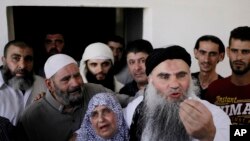Muslim cleric Abu Qatada walked free from a Jordanian jail on Wednesday after being cleared of charges of conspiring in a plot to attack tourists - his second acquittal this year following a long extradition process from Britain.
The state security court in the capital Amman ruled that the charges against the radical preacher - providing spiritual and material support for an attack planned during New Year celebrations in Jordan in 2000 - lacked sufficient evidence.
"Abu Qatada has been released from prison and is now on his way home,'' a judicial source told Reuters.
Smiling and dressed in brown prison fatigues, the cleric had earlier waved to his family in the court room after the verdict was announced, a witness said.
His wife and relatives hugged each other and shouted "thanks and praise to God!'' after the ruling, which a written verdict from Judge Ahmad Qatarneh called unanimous, witnesses said.
Abu Qatada was extradited from Britain last year after a lengthy legal process and acquitted in June in a separate case of charges of conspiring to commit acts of terrorism. That acquittal was also based on lack of evidence.
In London, a Home Office spokeswoman said it was a relief the cleric was no longer in Britain posing a security threat, and said he would never return.
"The UK courts agreed that Abu Qatada posed a threat to national security... (He)... remains subject to a deportation order and a United Nations travel ban. He is not coming back to the UK,'' she said.
Wednesday's session was a retrial in which the prosecution had argued the cleric was a mentor to militant cells in Jordan while he was in Britain, providing them with spiritual and material support during the late 1990s.
In absentia
Abu Qatada had previously been sentenced in absentia by a Jordanian court to life imprisonment for conspiracy to carry out attacks against U.S. and other targets inside U.S.-allied Jordan.
On Wednesday, the court upheld a confession which had convicted him in absentia, which his defense said had been extracted under torture.
European and British courts used the confession to delay his deportation until he agreed to return to Jordan for a retrial.
Despite misgivings about the ruling that upheld the confession, Abu Qatada's lawyer Ghazi Thunaibat said "justice had prevailed.''
"This goes a long way to implementing the agreement between Britain and Jordan,'' the lawyer added.
Abu Qatada's return to Jordan was made possible by an extradition treaty that satisfied concerns of British judges about the use of evidence obtained through torture.
Jordan regularly arrests Islamist suspects and puts them on trial in military courts that rights groups say lack proper legal safeguards. Jordan denies it convicts people using confessions extracted under duress.
Linked by a Spanish judge to the late al-Qaida leader Osama Bin Laden, Abu Qatada has been in and out of jail in Britain since 2001 prior to his extradition.
Jordanian security officials and experts on Islamist radical groups say Abu Qatada's ideological writings have influenced many youths involved with al- Qaida.
Abu Qatada has used some court hearings to lend support to global al-Qaida chief Ayman al-Zawahiri in a deadly row with rival militant group Islamic State, which has taken control of swathes of land in Iraq and Syria and is now the target of U.S. air attacks backed by Arab allies.





